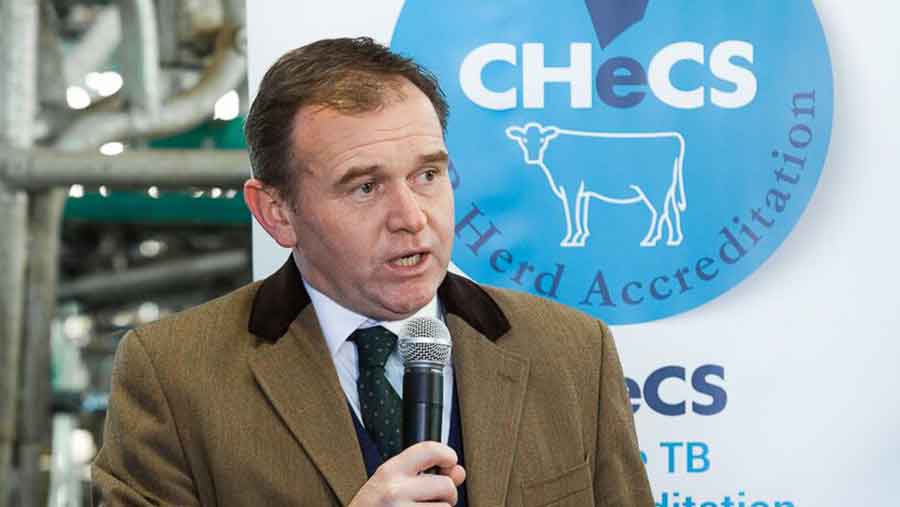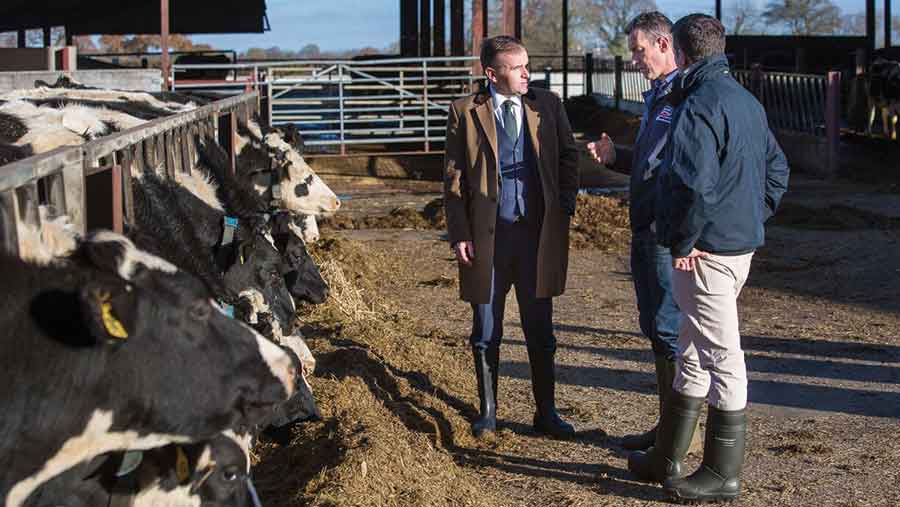New TB accreditation scheme launches

A new, voluntary TB-accreditation scheme has been launched to help farmers in England and Wales combat the disease.
The scheme, which is being run by Cattle Health Certification Standards (CHeCS), will award herds a score for every year it is free from the disease, with statuses ranging from 0-10 and is planned to encourage farmers to improve bio-security on-farm, to minimise the risk of infection.
Attending the launch of the industry-led initiative at Laddenside Farm, Iron Acton, near Bristol, farming minister George Eustice welcomed the scheme and said it would recognise low-risk herds selling from high-risk regions that were taking extra biosecurity steps to control the disease.
See also: How maedi visna led to whole flock cull
“There are around 40% of cattle farmers in high-risk areas that have never had a TB breakdown and it’s important they are able to trade normally and effectively.
“This is one part of the solution to rolling back TB and I think [it] will be taken up widely by many different farmers.”
How the scheme works and how it differs to statutory controls
- Farmers participating in the scheme will still be required to undertake government statutory testing. With the farmer’s agreement this data will be accessed by CHeCS to award those participating farms with a starting herd status. Zero represents a herd that has had a breakdown in the past 12 months while 10 is indicative that a herd has been clear 10 years or more.
- Pre-and-post movement testing must be carried out at the farmer’s expense.
- Under the new scheme farms must have a quarantine facility for incoming animals and it is recommended bought-in animals are kept separate until they pass their post-movement test so if they fail this does not affect the accredition of the rest of the herd.
- The herd must also take steps to improve biosecurity – this will be assessed annually by the farm’s vet and an annual herd health plan must be carried out.
- Herds cannot lose their CHeCs accredition unless they fail to abide by CHeCS rules. If they fail a TB test this will only affect their TB rating (0-10).
- The CHeCS model assesses all the biosecurity measures but it only incorporates the ones applicable to individual farms to minimise costs. For example, a herd with no contact with neighbouring herds would not be asked to secure boundary fences.
BCVA president Andrew Cobner said the scheme would give farmers the chance to fight back against the insidious disease.
“The trouble with TB is it can sap the morale of vets and farmers alike. All too often we are confronted with the view that there is little or nothing we can do to control TB. We wouldn’t accept this attitude with any other infectious disease so it’s time farmers are vets fought back.
“We have comprehensive control programmes in place across the UK, a supportive government and we are in a perfect place to get this going.”
Trading disparities
In effect he said the scheme should create fewer trading disparities among farms and TB regions.
“At the moment the only question asked is whether the animal is coming from a four-year testing area or a one year. But there are herds coming from high-risk areas that are low risk.”
However, suckler farmer James Small and NFU South West regional board chairman said it was important the scheme remained voluntary so it didn’t discriminate against those farms that would find it difficult to achieve a TB-free status.
“What we all have to recognise is in areas where there’s wildlife reservoirs this scheme will have a limited usefulness.
“As we see greater roll out of the culls this scheme is going to play a more important role as businesses look to restock but we are talking years into the future.”
Case study: Mike King, Kingspool Holsteins, Iron Acton, near Bristol
Dairy farmer and RABDF chairman Mike King is one of the first dozen farmers to sign up to the CHeCS Btb herd accredition scheme.
Mr King, who milks 500 pedigree Holsteins, signed up to the scheme three months ago.
His herd has been under restriction since August and is currently on 60-day testing. He won’t progress his CHeCS status until he goes clear but he still thinks it is worthwhile.
 “Life with TB is a whole different way of farming and you do become a bit numb to it.”
“Life with TB is a whole different way of farming and you do become a bit numb to it.”
He says the scheme is helping him to identify areas in which he can improve biosecurity.
“It is about identifying areas you can improve as part of the scheme, which will hopefully help to deal with the disease.”
As part of new measures he has:
- Put roller doors on feed sheds to keep out wildlife
- Cut cattle to cattle contact with neighbouring herds by zero grazing those fields or using them for arable crops
- Will next be tinning and lowering gates to stop badgers from entering cow sheds
For Mr King, who normally sells 100 breeding heifers annually, the financial implications of being shut down with TB have been massive. He has been forced to retain 80 heifers, which has put pressure on stocking rates and cashflow.
“We would normally have been selling animals to other farmers and we are not able to do that at the moment.”
He hopes in the future the scheme will enable him to build his CHeCS points up and give him the confidence to trade with the rest of the industry.
